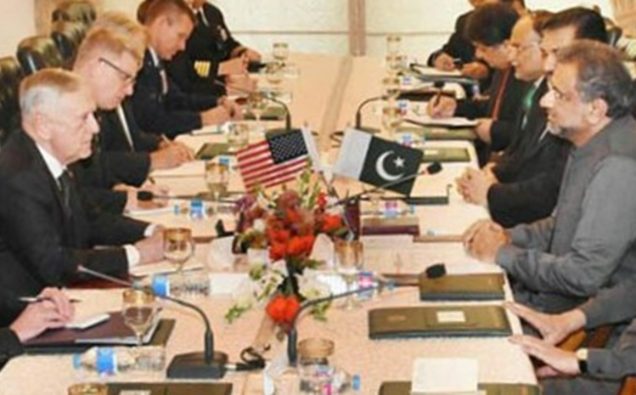
Photo: Pakistan Prime Minister’s House, Islamabad
Defense Secretary James Mattis, one of the most influential figures in President Trump’s Administration, has emphasized that finding common ground with Pakistan is the appropriate way to achieve counterterrorism objectives in the region, where the U.S. remains engaged in militancy-hit Afghanistan since 9/11 terror attacks.
Mattis is in Pakistan for meetings with top Pakistani leaders including Prime Minister Shahid Khaqan Abbasi and Army Chief Qamar Javed Bajwa, and his comments came on way to the South Asian country.
“That’s not the way I deal with issues,” Mattis said, according to a VOA report, rejecting a suggestion that he would “prod” the Pakistanis on fighting terrorism.
“I believe that we (can) work hard on finding common ground and then we work together,” the U.S. Defense Secretary said.
Pakistan’s prime minister, meanwhile, has renewed Islamabad’s commitment to support efforts to find peace and stability in the landlocked Afghanistan on its Western border.
Meanwhile, the Pentagon has said Secretary Mattis’ visit continues U.S. South Asia strategy dialogue.
Mattis is visiting Pakistan for the first time as defense secretary and had been to the key country on several occasion in the past.
“The U.S. remains committed to a pragmatic relationship that expands … cooperation on shared interests while reinforcing President Trump’s call for action against terrorist safe havens,” the secretary said of ties and cooperation with Pakistan.
The U.S. and Pakistan have both been stressing progress in Afghanistan since President Donald Trump announced his new strategy for the country reeling against a fierce Afghan Taliban insurgency and the ISIS threat.
But Islamabad and Washington differ on the way to achieve peace in Afghanistan, with Pakistani officials calling for a political settlement and the U.S. depending more on military options.
The United States and Pakistan also have sharp differences over the issue of Afghan Taliban including the Haqqani network militants being able to Pakistani soil for cross-border attacks in Afghanistan. Islamabad denies the charge of giving refuge to any militant group but the U.S alleges that Islamabad either ignores the Afghan Taliban who have a sanctuary in the country.
Some senior U.S. officials including the CIA Director Mike Pompeo have suggested that if Islamabad does not move strongly against the Afghan Taliban allegedly operating from its soil, the U.S. would be prepared to take action.
But the situation in the South Asian region is complex. Pakistan has accused Afghanistan of allowing anti-Pakistan militant groups to operate from its soil. Afghan Chief Executive Officer Abdullah Abdullah, who shares power with President Ashraf Ghani, accepted this during his recent visit to Washington but said the militants carry out their activities from ungoverned areas.
Pakistan has also accused New Delhi of backing militancy in Balochistan from across the Afghan border, where it has been increasing its influence in recent years.

















